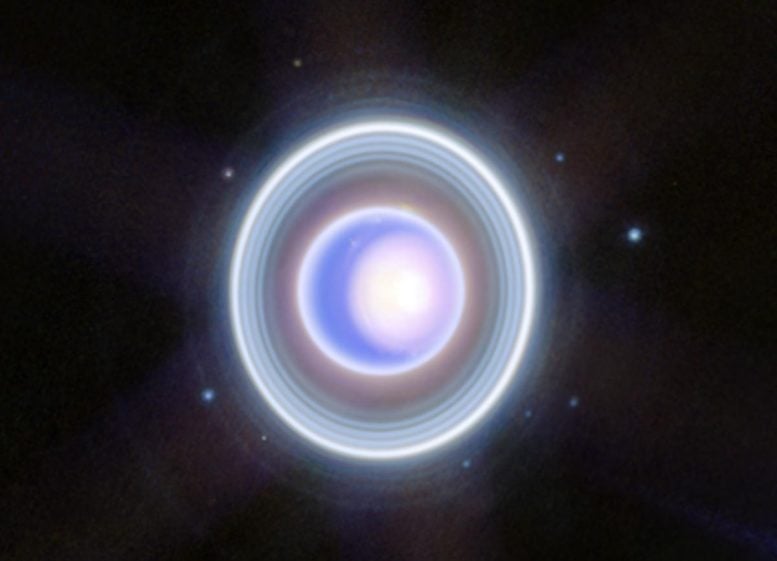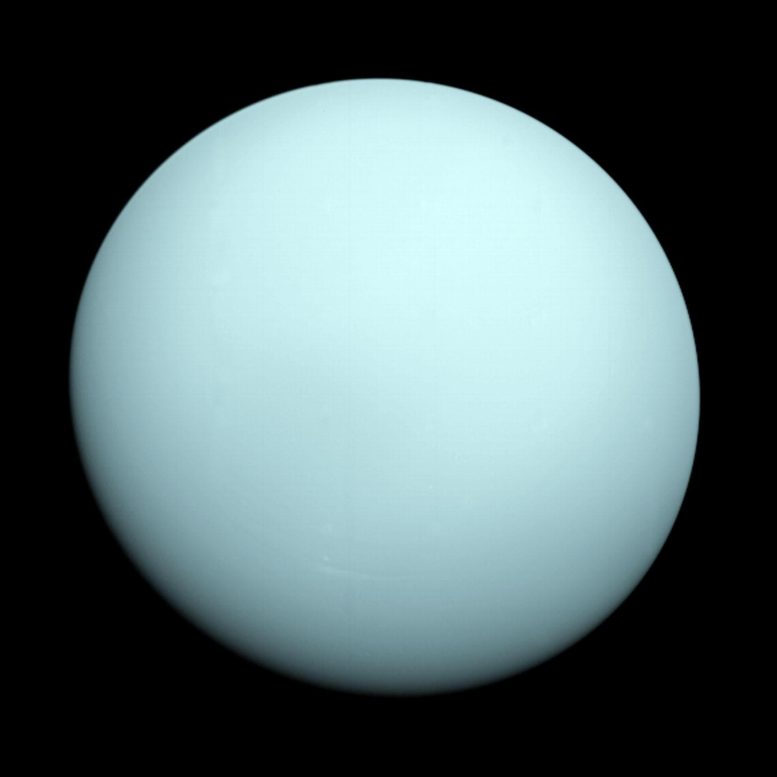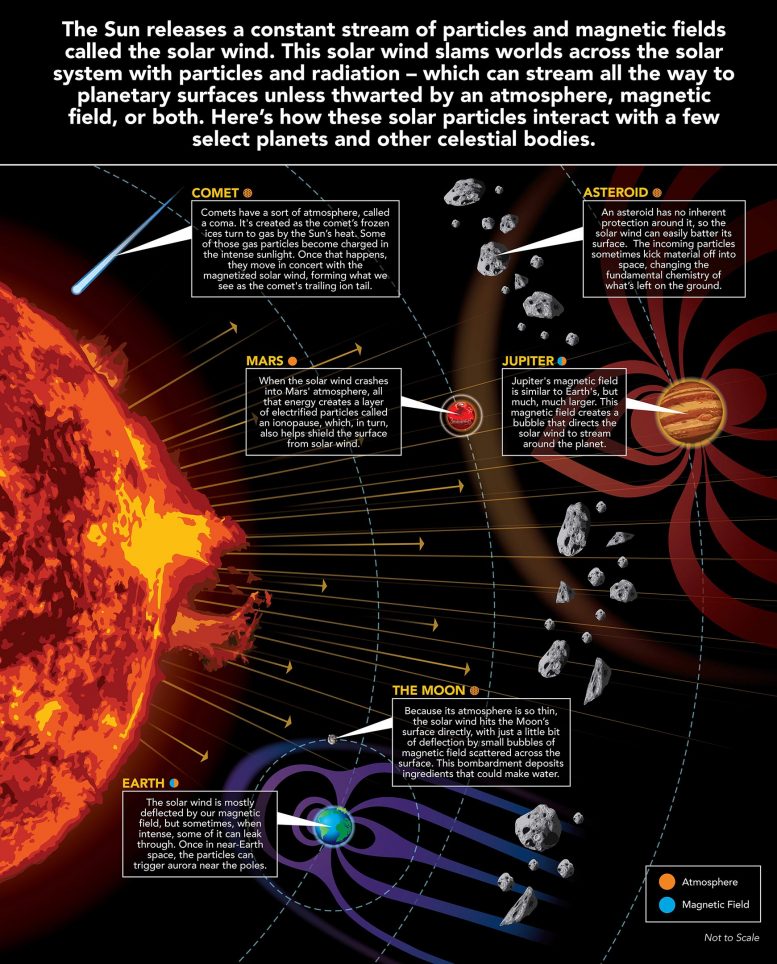
Posted on 11/14/2024 5:38:46 AM PST by Red Badger

This image of Uranus from NIRCam (Near-Infrared Camera) on NASA’s James Webb Space Telescope shows the planet and its rings in new clarity. The Webb image exquisitely captures Uranus’s seasonal north polar cap, including the bright, white, inner cap and the dark lane in the bottom of the polar cap. Uranus’ dim inner and outer rings are also visible in this image, including the elusive Zeta ring—the extremely faint and diffuse ring closest to the planet. Credit: NASA, ESA, CSA, STScI
************************************************************************
NASA’s Voyager 2 flyby of Uranus decades ago shaped scientists’ understanding of the planet but also introduced unexplained oddities. A recent data dive has offered answers.
In 1986, Voyager 2’s flyby of Uranus caught the planet during a rare magnetic anomaly caused by unique space weather, which influenced its magnetosphere’s behavior, offering new insights into its intense radiation belts and suggesting potential activity on its moons.
Voyager 2’s Historic Uranus Flyby
In 1986, NASA’s Voyager 2 spacecraft made its historic flyby of Uranus, offering scientists their first—and still only—close-up view of this unique outer planet with its sideways rotation. During the flyby, Voyager 2 discovered new moons and rings, but it also unveiled perplexing mysteries. Energized particles around Uranus behaved in ways that defied scientists’ understanding of how magnetic fields trap particle radiation, establishing Uranus as an unusual case in our solar system.

The first panel of this artist’s concept depicts how Uranus’s magnetosphere — its protective bubble — was behaving before the flyby of NASA’s Voyager 2. The second panel shows an unusual kind of solar weather was happening during the 1986 flyby, giving scientists a skewed view of the magnetosphere. Credit: NASA/JPL-Caltech
********************************************************************************
Now, new research analyzing data from that 38-year-old flyby has shed light on this mystery, revealing it was likely due to a cosmic coincidence. Just days before Voyager 2’s flyby, an unusual space weather event compressed Uranus’s magnetosphere, dramatically altering the planet’s magnetic field and creating the unique conditions Voyager 2 observed.
“If Voyager 2 had arrived just a few days earlier, it would have observed a completely different magnetosphere at Uranus,” said Jamie Jasinski of NASA’s Jet Propulsion Laboratory in Southern California and lead author of the new work published on November 11 in Nature Astronomy. “The spacecraft saw Uranus in conditions that only occur about 4% of the time.”

Uranus Voyager 2
NASA’s Voyager 2 captured this image of Uranus while flying by the ice giant in 1986. New research using data from the mission shows a solar wind event took place during the flyby, leading to a mystery about the planet’s magnetosphere that now may be solved. Credit: NASA/JPL-Caltech
*******************************************************************************
Importance of Magnetospheres
Magnetospheres serve as protective bubbles around planets (including Earth) with magnetic cores and magnetic fields, shielding them from jets of ionized gas — or plasma — that stream out from the Sun in the solar wind. Learning more about how magnetospheres work is important for understanding our own planet, as well as those in seldom-visited corners of our solar system and beyond.
That’s why scientists were eager to study Uranus’ magnetosphere, and what they saw in the Voyager 2 data in 1986 flummoxed them. Inside the planet’s magnetosphere were electron radiation belts with an intensity second only to Jupiter’s notoriously brutal radiation belts. But there was apparently no source of energized particles to feed those active belts; in fact, the rest of Uranus’ magnetosphere was almost devoid of plasma.
The missing plasma also puzzled scientists because they knew that the five major Uranian moons in the magnetic bubble should have produced water ions, as icy moons around other outer planets do. They concluded that the moons must be inert with no ongoing activity.

Solar Wind Across Our Solar System Infographic. Credit: NASA’s Goddard Space Flight Center/Mary Pat Hrybyk-Keith
******************************************************************************
Impact of Solar Wind Events
So why was no plasma observed, and what was happening to beef up the radiation belts? The new data analysis points to the solar wind. When plasma from the Sun pounded and compressed the magnetosphere, it likely drove plasma out of the system. The solar wind event also would have briefly intensified the dynamics of the magnetosphere, which would have fed the belts by injecting electrons into them.
The findings could be good news for those five major moons of Uranus: Some of them might be geologically active after all. With an explanation for the temporarily missing plasma, researchers say it’s plausible that the moons actually may have been spewing ions into the surrounding bubble all along.
Future Missions and Scientific Excitement
Planetary scientists are focusing on bolstering their knowledge about the mysterious Uranus system, which the National Academies’ 2023 Planetary Science and Astrobiology Decadal Survey prioritized as a target for a future NASA mission.
JPL’s Linda Spilker was among the Voyager 2 mission scientists glued to the images and other data that flowed in during the Uranus flyby in 1986. She remembers the anticipation and excitement of the event, which changed how scientists thought about the Uranian system.
“The flyby was packed with surprises, and we were searching for an explanation of its unusual behavior. The magnetosphere Voyager 2 measured was only a snapshot in time,” said Spilker, who has returned to the iconic mission to lead its science team as project scientist. “This new work explains some of the apparent contradictions, and it will change our view of Uranus once again.”
Voyager 2, now in interstellar space, is almost 13 billion miles (21 billion kilometers) from Earth.
Reference:
“The anomalous state of Uranus’s magnetosphere during the Voyager 2 flyby”
by Jamie M. Jasinski, Corey J. Cochrane, Xianzhe Jia, William R. Dunn, Elias Roussos, Tom A. Nordheim, Leonardo H. Regoli, Nick Achilleos, Norbert Krupp and Neil Murphy, 11 November 2024, Nature Astronomy.
DOI: 10.1038/s41550-024-02389-3
Uranus Ping!...................
It has rings?
It’s trying to copy Saturn?
What is very compelling is that Uranus does smell like your anus, hence the name!!
All the gas giants have rings, just not as spectacular as Saturn’s.
Uranus was known to have rings before the Voyagers were launched, since the occultation of Uranus with a star previously had revealed the star blinking out before and after the occultation as it passed behind the rings...............


^
Ruh Roh!
“Send more fiber!”
[gas giants]
Just to be clear, we’re not talking about certain Democrat women or Chris Christie are we?
If it’s space, then can we launch a gigantic bottle of Pepto-Bismol?
Couldn’t hurt and might help. Dunno...
Sometimes it itches but I don’t believe that mine has any perplexing mysteries.
It’s a great article. In recent years I’ve been studying the Sun more. I’m starting to photograph it in white light. I’ve been turning my attention towards photographing the Sun, the Moon, and the planets. My scope is really rather small for the task compared to some, but it should give me some excellent pics.
A great article, thanks for posting it!
In April I went up to southern Quebec...just over the Vermont border...to see the eclipse. It was total there for about 2 minutes.The sky was cloudless but I was expecting more. It got dark...like twilight...but it didn’t get *completely* dark. I was expecting 2AM darkness with starlight.
How sophomoric of you to post that comment.
You’re a class act......
You’re another class act.
Post the gutter tripe somewhere else....say, a teenage forum.
i blame dairy
I didn’t get to a location with totality, but at my location in Northern Illinois the Sun was about 80-90% covered. It did get a little bit dim, and a little bit cooler. I managed to get some pictures with my iPhone thru the eyepiece. I had recently purchased a PlayerOne Mars-C planetary camera, but wasn’t really familiar with it to try to capture some images with it. And, having used Apple products for the past 10 years, I also bought a Windows laptop to process the images. I’m still trying to get used to Windows 11. Apple computers are way out of my price range right now.
There’s nothing like the solar system to bring you down to earth.
....just posting any item with the word “Uranus” in it on this site brings out the punsters. Like clockwork...as “regular” as can be....oh...sorry...
Disclaimer: Opinions posted on Free Republic are those of the individual posters and do not necessarily represent the opinion of Free Republic or its management. All materials posted herein are protected by copyright law and the exemption for fair use of copyrighted works.